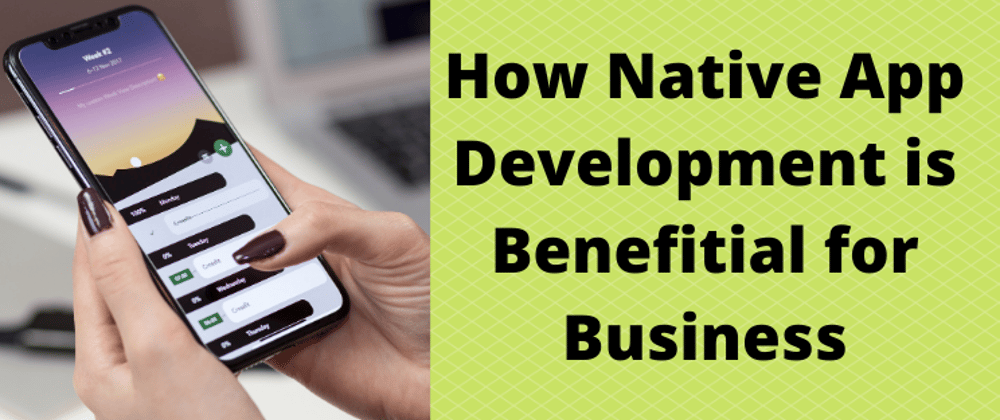Native applications are more responsive, quicker, and offer a greater user experience. These apps operate quicker since they are written in languages specific to the ecosystem of the platform. Native apps are very fast and responsive because they are built for that specific platform and are compiled using the platform's core programming language and APIs. As a result, the app is much more efficient. The device stores the app allowing the software to leverage the device's processing speed.
What is Native App Development
Native app development is the creation of software programs that run on specific devices and platforms. You can build native apps for desktops, smart TVs, and all kinds of gadgets, the most popular target devices are smartphones.
Native app development is the development of an application that runs on particular devices and platforms. Native app for Android is developed using Java or Kotlin and native app for iOS is developed using Swift or Objective-C.
Native mobile app development involves building apps for particular mobile operating systems, and users access them from dedicated app stores (such as the App Store or Google Play). If you intend to build an application for iOS, Mobile App Developers usa will use programming languages Objective-C or Swift. In contrast, developing for Android calls for the programming languages Java or Kotlin.
Better performance
Native mobile apps directly interact with native APIs without depending on middleware such as plugins and WebViews. As there are fewer dependencies, native mobile apps are faster and more responsive than hybrid apps. This is especially important for performance-centric apps like games and graphic-heavy applications.
The Ultimate User Experience
Technical and functionality shortcomings aside, non-native apps cannot compete with the responsiveness and user experience of the native approach. If a business intends to use an app as a central tool for interacting with customers and stakeholders, it must deliver an excellent user experience that supports mobile app retention. Dissatisfaction, even in the slightest, can lead to poor retention rates and high uninstall.
Native app development gives app developers considerably more control over the user experience and also allows them to design the apps for easy support. We believe it’s best to stick with native and not sacrifice the design elements that are unique to each platform. However, if you aren’t too concerned about the overall user experience and want to get something to market fast and cheap, a web app may be the way to go.
Native Apps Work Offline
Native apps work even if there is no internet connectivity.
So, in situations where you are stuck somewhere with limited or no service, such as an airplane, underground tunnel, or subway, native apps are accessible.
Native Apps Maintain Aspect Ratios
Aspect ratio is the ratio of width to height of different screens. It is an important factor that determines the quality of an image.
Many apps collapse and start functioning improperly upon changing the device's size and shape. Native apps have better control over the orientation, size, and resolution of the app.
Developers have access to layout features while preparing a native app. When they set the size of the screen, a native app maintains the aspect ratio on its own no matter which screen it runs on.
Android provides Constraint Layout and iOS provides Auto Layout features that help in maintaining aspect ratio on their respective devices.
Apart from maintaining aspect ratios, these features also provide different DPI (dots per inch) for every screen that maintains the quality of the visuals.
Security
While maximum hybrid apps depend just on system browser security, cross-platform and native apps are safeguarded by various layers of an OS, which makes them hard to misuse.
Moreover, they don’t rely on any third-party system, utilizing just official APIs that have been thoroughly examined across different system versions.
Because of the long building of official platform SDKs, it’s more possible that they can reduce every growing security problem.
Ultimately, official platform launches also occur less frequently than framework launches. With lengthy launch cycles, you can anticipate dependable, properly examined, and more secure software.
Because of insufficient time, shorter launch cycles can be less thoroughly ready with the choice of getting solved later.
Maintenance
The maintenance of a native app is a bit complex unlike a hybrid app’s maintenance because the latest version of the app should be launched.
However, users can get information about the most recent update with ease. Additionally, native apps upload the maximum content on installation.
Thereby, your game or messenger doesn’t require being updated continuously, unlike the mobile shop or magazine which is supposed to be hybrid apps. So, everything relies on the app type.
Conclusion:
If you are looking to develop a Native Mobile Application for your business you can contact FuGenx Technologies which is an award-winning Android application development company in Los angels







Top comments (0)
Some comments may only be visible to logged-in visitors. Sign in to view all comments.